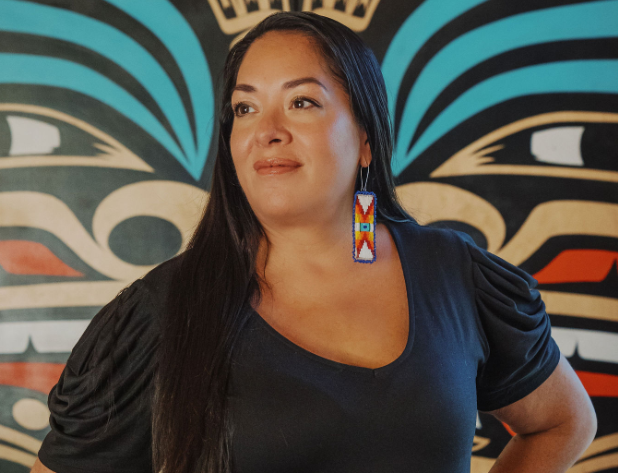
- Details
- By Kaili Berg
Abigail Echo-Hawk, a prominent Indigenous researcher and citizen of the Pawnee Nation of Oklahoma, has been named to the 2024 TIME100 Next list, which honors 100 individuals who are shaping the future of global leadership.
This recognition highlights her groundbreaking work in public health and data sovereignty, especially in relation to Indigenous communities.
The TIME100 Next list, an expansion of TIME magazine's iconic Person of the Year and TIME100 lists, focuses on up-and-coming leaders in diverse fields, including health, politics, climate, arts, and more. Echo-Hawk’s selection solidifies her influence as a leader who is redefining the role of Indigenous values in western research frameworks.
Echo-Hawk is the Executive Vice President of the Seattle Indian Health Board and the director of its research division, the Urban Indian Health Institute. She has long been recognized for her commitment to decolonizing data and ensuring that Indigenous voices are at the forefront of health and policy discussions.
Labeled the "Unapologetic Auntie of Indigenous Data" by the New York Times, Echo-Hawk has dedicated her career to integrating Indigenous methodologies into scientific research, challenging western norms that often overlook Native communities.
“I am deeply humbled and honored to be named alongside some of the world's most brilliant minds, including Indigenous actor Kali Reis,” said Echo-Hawk in a press release. “Indigenous leadership is often recognized only within our own community, so I hold this recognition with immense gratitude for the past, present, and future leaders.”
Echo-Hawk’s work extends far beyond public health research. She is a leading advocate in the fight to end the epidemic of Missing and Murdered Indigenous Women and Girls (MMIWG). A co-author of a groundbreaking report, she brought national attention to the staggering number of MMIWG cases in urban centers across the United States.
Her advocacy doesn’t stop with research, Echo-Hawk uses art as a powerful form of protest. When the Seattle Indian Health Board was mistakenly sent body bags instead of PPE during the COVID-19 pandemic, she created a ribbon dress from body bags to raise awareness for MMIWG, turning the incident into a symbol of resistance.
“Abigail is revolutionizing how governments, institutions, and medical professionals approach health for American Indians and Alaska Natives,” said U.S. Senator Patty Murray in a press release. “Her research and tireless advocacy to address violence against Indigenous women have spurred policy changes across the country, at all levels of government. Abigail is a real changemaker and all of Washington state is proud of her leadership."
Echo-Hawk has also served on several national research committees, including one under the National Academies of Sciences, Engineering, and Medicine, where she contributed to developing an equitable distribution framework for the COVID-19 vaccine. Her leadership has been pivotal in ensuring that Native communities receive fair access to health resources.
As an influential voice in Indigenous health and data sovereignty, Abigail Echo-Hawk’s inclusion in the TIME100 Next list recognizes her vital role in shaping a future where Native voices are empowered, and Indigenous knowledge is valued globally. Her leadership continues to drive forward much-needed reforms in health, policy, and the treatment of Indigenous communities across the nation.
More Stories Like This
Native News Weekly (August 25, 2024): D.C. BriefsCheyenne River Youth Project to Celebrate Women’s Strength at Barbie-Themed Passion for Fashion on March 14
Celebrating Native American Women
Native Bidaské: The Illusion of Freedom and the Myth of America 250, Leonard Peltier Speaks Out
Monday Morning (March 2, 2026): Articles You May Have Missed This Past Weekend
Help us defend tribal sovereignty.
At Native News Online, our mission is rooted in telling the stories that strengthen sovereignty and uplift Indigenous voices — not just at year’s end, but every single day.
Because of your generosity last year, we were able to keep our reporters on the ground in tribal communities, at national gatherings and in the halls of Congress — covering the issues that matter most to Indian Country: sovereignty, culture, education, health and economic opportunity.
That support sustained us through a tough year in 2025. Now, as we look to the year ahead, we need your help right now to ensure warrior journalism remains strong — reporting that defends tribal sovereignty, amplifies Native truth, and holds power accountable.
 The stakes couldn't be higher. Your support keeps Native voices heard, Native stories told and Native sovereignty defended.
The stakes couldn't be higher. Your support keeps Native voices heard, Native stories told and Native sovereignty defended.
Stand with Warrior Journalism today.
Levi Rickert (Potawatomi), Editor & Publisher


